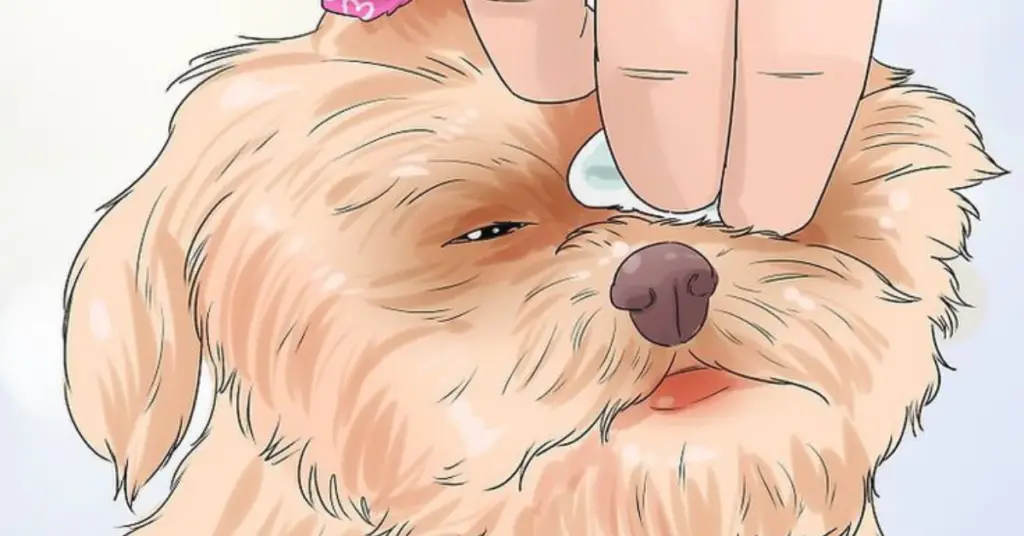
Shih Tzus are adorable companions known for their expressive eyes. However, like all breeds, they are prone to specific eye issues that can affect their vision and overall health. Understanding these common problems and knowing how to address them can help ensure your Shih Tzu’s eyes remain healthy and vibrant throughout their life.
1. Epiphora (Excessive Tearing)

Epiphora is a common issue in Shih Tzus characterized by excessive tearing. It can be caused by various factors such as blocked tear ducts, eyelash abnormalities, allergies, or infections. Signs include tear stains, redness around the eyes, and skin irritation.
Solution: Regularly clean your Shih Tzu’s eyes with a damp cloth to remove tear stains and prevent skin irritation. Ensure their facial hair is trimmed around the eyes to minimize irritation. If tearing persists or is accompanied by other symptoms, consult your veterinarian for a thorough examination and appropriate treatment.

2. Corneal Ulcers
Corneal ulcers are injuries to the outermost layer of the eye (cornea) and are common in Shih Tzus due to their prominent eyes. Causes include trauma, foreign objects, or infections. Symptoms include squinting, excessive blinking, redness, and discharge.
Solution: Immediate veterinary attention is crucial for corneal ulcers to prevent complications and preserve vision. Treatment may include topical medications, protective eye drops, or in severe cases, surgical intervention. Avoid exposing your Shih Tzu to potential eye injuries, such as sharp objects or chemicals.

3. Cherry Eye
Cherry eye is a prolapse of the third eyelid gland, appearing as a red, swollen mass in the corner of the eye. It can occur spontaneously or due to genetic predisposition. Cherry eye can be uncomfortable for your Shih Tzu and may lead to dry eye if untreated.
Solution: Consult your veterinarian promptly if you notice cherry eye in your Shih Tzu. Treatment options include surgical correction to reposition the gland or medications to reduce inflammation. Early intervention can prevent complications and discomfort.

4. Progressive Retinal Atrophy (PRA)
Progressive Retinal Atrophy (PRA) is a genetic condition leading to degeneration of the retina over time. It causes gradual vision loss and can eventually lead to blindness. Shih Tzus are predisposed to PRA, and symptoms may include night blindness and difficulty navigating in dim light.

Solution: While there is no cure for PRA, early detection through regular veterinary eye exams is crucial. Manage your Shih Tzu’s environment to accommodate their vision changes and provide consistent routines. Consult your veterinarian for guidance on supporting a visually impaired Shih Tzu.
5. Conjunctivitis (Pink Eye)
Conjunctivitis, or pink eye, is inflammation of the conjunctiva (the thin membrane covering the eye and inner eyelids). It can be caused by allergies, infections (bacterial or viral), irritants, or foreign bodies. Symptoms include redness, swelling, discharge, and itching.

Solution: Treatment for conjunctivitis depends on the underlying cause. Your veterinarian may prescribe antibiotic or anti-inflammatory eye drops. Keep your Shih Tzu’s eyes clean and free from irritants. Avoid exposure to allergens or chemicals that may exacerbate symptoms.
Conclusion
Understanding and addressing common eye problems in Shih Tzus is essential for maintaining their eye health and overall well-being. By recognizing symptoms early and seeking prompt veterinary care, you can prevent complications and ensure your furry friend enjoys clear, comfortable vision. Remember to monitor your Shih Tzu’s eyes regularly, practice good hygiene, and seek professional guidance whenever you notice any changes or concerns. With proper care, you can help your Shih Tzu lead a happy, healthy life with bright, beautiful eyes.



